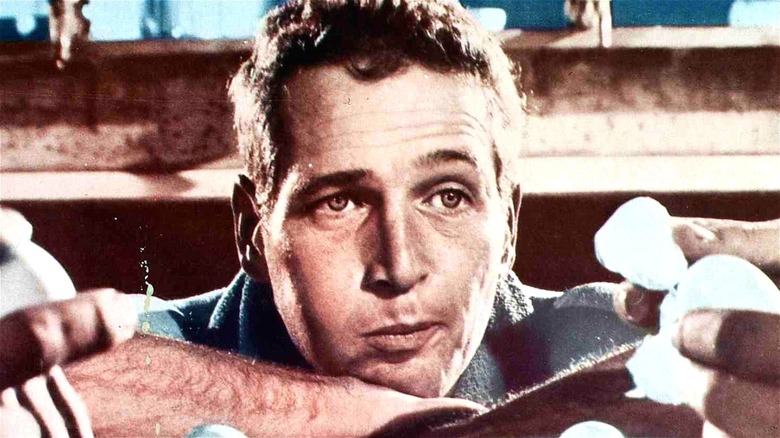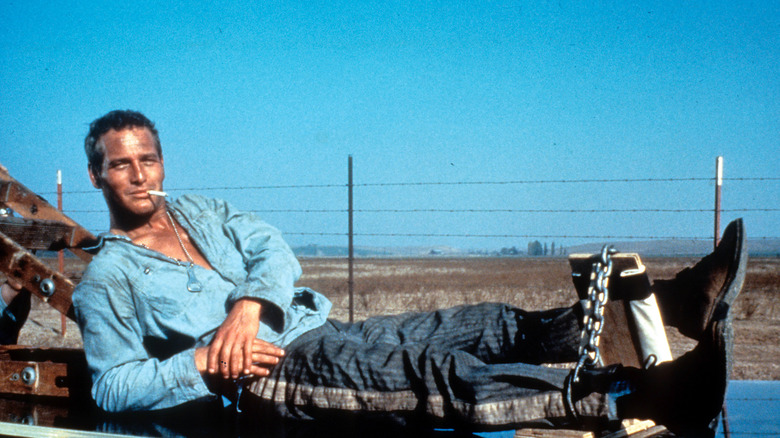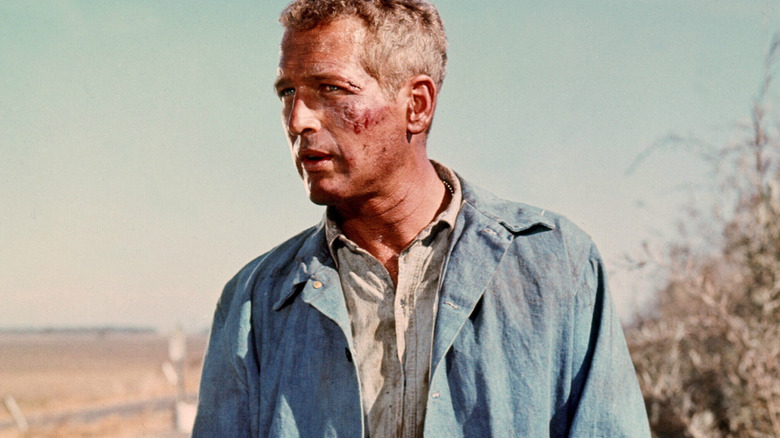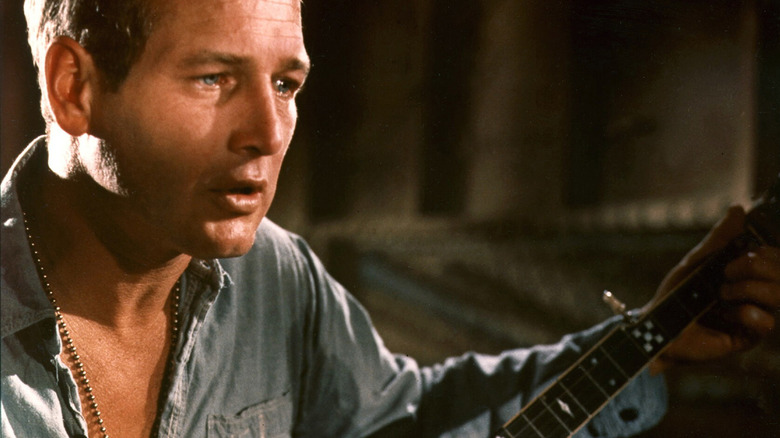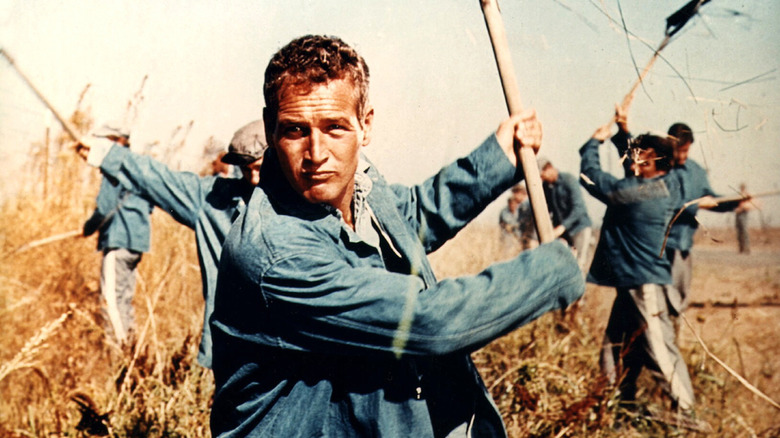The Ending Of Cool Hand Luke Explained
The award-winning, critically acclaimed (with a perfect 100% Tomatometer score at Rotten Tomatoes) 1967 film "Cool Hand Luke" has a legendary pedigree and years of acclaim behind it. The film won George Kennedy a Best Supporting Actor Oscar for his performance as Dragline, and Paul Newman was nominated for Best Actor for his performance as Lucas "Luke" Jackson, whose rebellion against harsh life on a Florida prison chain gang soon turns into a battle for personal freedom and justice for his fellow prisoners.
The movie's script — based on a 1965 book by Donn Pearce based in part on his own time in prison — was also rightfully nominated for an Oscar. Though many tropes used within it have passed into cultural immortality, in the years since the movie's release it might be hard to puzzle out just what happens at the end of the film. However, we have an explainer for that. Join us on a journey of rebellion, martyrdom, and anti-establishmentarianism.
Luke Jackson Vs. the Establishment: Round Four
"Cool Hand Luke" contains two diametrically opposed themes within its plot structure — Luke's constant desire to rebel against the expectations of the social order in which he must survive to live, and the Christlike shroud of martyrdom he finds himself donning to earn the respect of the inmates surrounding him. He has suffered mightily, eating 50 eggs on a bet and being beaten and sent to solitary confinement and forced to perform acts of hard labor by the warden, aka Captain (Strother Martin) and Walking Boss Godfrey (Morgan Woodward), who supervises the chain gang Luke has been assigned to.
In the final scenes of the film, a seemingly humbled Luke is seen working on the chain gang, eagerly trying to please Godfrey in a way that opposes the sarcasm with which he has previously approached interactions with the man. Godfrey seems to accept Luke's newly servile nature and allows Luke the privilege of placing an item in his truck. Luke promptly steals both Godfrey's truck and the keys to Captain's, making a break for freedom.
Luke isn't alone on his quest — Dragline rushes to catch up with the truck and jumps in. This is a fascinating moment of development for Kennedy's more even-tempered prisoner character, who had been the leader of their crew before Luke's arrival and had previously urged him to maintain an even temper around Godfrey. With this one moment of exuberant rebellion, he's rejected all of the caution he tried to encourage in others.
Luke has escaped successfully twice before. This will mark his final attempt.
Luke Jackson Vs God: Round Three
Dragline and Luke split up and ditch the truck. It's here that Luke enters an empty church and tells God that "it's time we had a little talk." He proceeds to explain that he knows he's done wrong — killed in the war and gotten drunk — but "you ain't dealt me no cards in the long term. It looks like you got things fixed so I can never win out."
"You made me like I am. Just where am I supposed to fit in?" he continues. Admitting that he started out "strong and fast," he has accepted that he has played the last card in the hand he was dealt, but still begs him for guidance. Nothing happens. He remarks to God, "I guess I'm pretty tough to deal with, huh?" and decides to forgo further requests from help from the almighty, choosing to act on his own best faith.
This is the final time that Luke speaks aloud to God during the film — the first time, he cockily baits him into action after helping his chain gang pave a road in less than a day's time ahead of a storm, which is immediately followed by him learning that his mother has died. The second time, he begs God for mercy after being forced to dig and fill in dozens of graves between beatings as punishment for his second escape. In less than two years, he has gone from self-confidently defiant to humbled to bewildered and beseeching, then ultimately sardonic and self-deprecating. He still seems to believe that God exists but considers himself unworthy of interventive guidance from anyone, and also leans on the notion of free will guiding his actions, which he owns.
But, as if answering Luke's call, Dragline arrives.
'What we've got here is a failure to communicate'
It's not just Dragline who's found Luke — the authorities have finally caught up to them. He soon realizes that his friend is acting as an emissary for the authorities. Luke is given an opportunity — surrender peacefully and he won't be harmed. This is a change from what The Captain told him earlier in the film, that if he escaped one more time, he'd be shot.
This quasi-betrayal sets the movie on the path toward its denouement. If in the movie's heavy Christian allegorical work, Luke is a combination of Jesus Christ and Job, suffering immense physical punishments stoically for the inspiration of others and to make their lives better, then Dragline has become Judas, telling the authorities where he left Luke in the hope that the inevitable punishment they both face will be lighter. It's also a final gesture of belief and reverence toward a system that he still on some level thinks will be just, fair and protective.
Whether or not one interprets his final gesture as suicidal in light of the Walking Boss' previous warnings is almost immaterial as Luke goes to the door, opens it, and sarcastically echoes a speech of The Captain's. The "What we've got here is a failure to communicate," speech, which ended up coming in at 11th place on AFI's 100 Years...100 Quotes list, is abbreviated to its first line before Luke is shot by Godfrey. Dragline carries him out, surrenders, and finally snaps, choking the line boss.
Luke smiles one last time as he's driven away, bleeding out in the back of the squad car. Godfrey's mirrored sunglasses crunch symbolically under the car's tires. In death, Luke has done what he could not do in life — find freedom and beat the system.
The aftermath - rebellion, martyrdom, and becoming a legend
At the very end of the film, we return to the prisoners on a chain gang. In leg irons, Dragline has resumed his position as leader of the crew. He is seen regaling the prisoners with tales of Luke's final rebellion. With fondness — and in spite of their previous conflicts — they remember their friend's refusal to submit to authority.
Dragline waxes nostalgic about Luke's smile — and we see a montage of the same — the confident and cocky smirk the authorities could never wipe off his face. As the camera pans back, we are able to note that there's a new line boss, and the implication is that Godfrey's decision to shoot Luke to death while he was unarmed, no matter how sarcastic his approach to the situation was, likely resulted in Godfrey, aka The Man With No Eyes' dismissal from his job. Luke has managed to change the established order of the prison's social caste, even though he had to die to do it.
Dragline refers to Luke as a "natural born world-shaker." As he gets on with the business of mowing back hay, we pan back far enough to realize that he and the rest of the prisoners stand at a crucifix-style crossroad in another bit of Christian symbolism. He and the rest of the inmates stand at a literal crossroad — what they do next will obviously be up to them.
Luke had previously sent Dragline a magazine featuring a picture of him partying with two attractive women during his second time on the lam, and it became a symbol of hope for the prisoners. We see it one more time, mended after being torn in half, as we fade to black.
